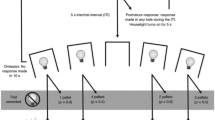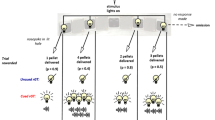Abstract
Rationale
Pramipexole and other direct dopamine agonist medications have been implicated in the development of impulsive behavior such as pathological gambling among those taking the drug to control symptoms of Parkinson’s disease or restless leg syndrome. Few laboratory studies examining pramipexole’s effects on gambling-like behavior have been conducted.
Objectives
The present study used a rodent model approximating some aspects of human gambling to examine within-subject effects of acute pramipexole (0.03, 0.1, 0.18, and 0.3 mg/kg) on rat’s choices to earn food reinforcement by completing variable-ratio (VR; i.e., gambling-like) or fixed-ratio (FR) response requirements.
Results
In a condition in which the VR alternative was rarely selected, all but the lowest dose of pramipexole significantly increased choice of the VR alternative (an average of 15% above saline). The same doses did not affect choice significantly in a control condition designed to evaluate the involvement of nonspecific drug effects. Pramipexole increased latencies to initiate trials (+9.12 s) and to begin response runs on forced-choice trials (VR = +0.21 s; FR = +0.88 s), but did not affect measures of response perseveration (conditional probabilities of “staying”).
Conclusions
The findings are consistent with clinical reports linking pramipexole to the expression of increased gambling in humans. Results are discussed in the context of neurobehavioral evidence suggesting that dopamine agonists increase sensitivity to reward delay and disrupt appropriate feedback from negative outcomes.



Similar content being viewed by others
References
Bakeman R (2005) Recommended effect size statistics for repeated measures designs. Behav Res Meth 37:379–384
Boulougouris V, Castañé A, Robbins TW (2009) Dopamine D2/D3 receptor agonist quinpirole impairs spatial reversal learning in rats: investigation of D3 receptor involvement in persistent behavior. Psychopharmacology (Berl) 202:611–620
Breuer ME, Groenink L, Oosting RS, Buerger E, Korte M, Ferger B et al (2009) Antidepressant effects of pramipexole, a dopamine D3/D2 receptor agonist, and 7-OH-DPAT, a dopamine D3 receptor agonist, in olfactory bulbectomized rats. Eur J Pharmacol 616:134–140
Brown PL, Jenkins HM (1968) Autoshaping of the pigeon’s key-peck. J Exp Anal Behav 11:1–8
Collins GT, Newman AH, Grundt P, Rice KC, Husbands SM, Chauvignac C et al (2007) Yawning and hypothermia in rats: effects of dopamine D3 and D2 agonists and antagonists. Psychopharmacology (Berl) 193:159–170
Collins GT, Tuccone A, Haji-Abdi F, Newman AH, Grundt P, Rice KC et al (2009) Proerectile effects of dopamine D2-like agonists are mediated by the D3 receptor in rats and mice. J Pharmacol Exp Ther 329:210–217
Cools R, Altamirano L, D’Esposito M (2006) Reversal learning in Parkinson’s disease depends on medication status and outcome valence. Neuropsychologia 44:1663–1673
Cornelius JR, Tippmann-Peikert M, Slocumb NL, Frerichs CF, Silber MH (2010) Impulse control disorders with the use of dopaminergic agents in restless legs syndrome: a case–control study. Sleep 33:81–87
Corrigan MH, Denahan AQ, Wright CE, Ragual RJ, Evans DL (2000) Comparison of pramipexole, fluoxetine, and placebo in patients with major depression. Depress Anxiety 11:58–65
Crockford D, Quickfall J, Currie S, Furtado S, Suchowersky O, el-Guebaly N (2008) Prevalence of problem and pathological gambling in Parkinson’s disease. J Gambl Stud 24:411–422
Dodd ML, Klos KJ, Bower JH, Geda YE, Josephs KA, Ahlskog JE (2005) Pathological gambling caused by drugs used to treat Parkinson’s disease. Arch Neurol 62:1377–1381
Driver-Dunckley ED, Samanta J, Stacy M (2003) Pathological gambling associated with dopamine agonist therapy in Parkinson’s disease. Neurology 61:422–423
Driver-Dunckley ED, Noble BN, Hentz JG, Evidente VG, Caviness JN, Parish J et al (2007) Gambling and increased sexual desire with dopaminergic medications in restless legs syndrome. Clin Neuropharmacol 30:249–255
Field DP, Tonneau F, Ahearn W, Hineline PN (1996) Preference between variable-ratio and fixed-ratio schedules: local and extended relations. J Exp Anal Behav 66:283–295
Fineberg NA, Potenza MN, Chamberlain SR, Berlin HA, Menzies L, Bechara A et al (2010) Probing compulsive and impulsive behaviors, from animal models to endophenotypes: a narrative review. Neuropsychopharmacology 35:591–604
Frank MJ, Samanta J, Moustafa AA, Sherman SJ (2007) Hold your horses: impulsivity, deep brain stimulation, and medication in Parkinsonism. Science 318:1309–1312
Giladi N, Weitzman N, Schreiber S, Shabtai H, Peretz C (2007) New onset heightened interest or drive for gambling, shopping, eating or sexual activity in patients with Parkinson’s disease: the role of dopamine agonist treatment and age at motor symptoms onset. J Psychopharmacol 21:501–506
Giovannoni G, O’Sullivan JD, Turner K, Manson AJ, Lees AJ (2000) Hedonistic homeostatic dysregulation in patients with Parkinson’s disease on dopamine replacement therapies. J Neurol Neurosurg Psychiatry 68:423–428
Grant JE, Schreiber L, Odlaug BL, Kim SW (2010) Pathologic gambling and bankruptcy. Compr Psychiatry 51:115–120
Grosset KA, Macphee G, Pal G, Stewart D, Watt A, Davie J et al (2006) Problematic gambling on dopamine agonists: not such a rarity. Mov Disord 21:2206–2208
Haluk DM, Floresco SB (2009) Ventral striatal dopamine modulation of different forms of behavioral flexibility. Neuropsychopharmacology 34:2041–2052
Hamidovic A, Kang UJ, de Wit H (2008) Effects of low to moderate doses of pramipexole on impulsivity and cognition in healthy volunteers. J Clin Psychopharmacol 28:45–51
Holman AJ (2009) Impulse control disorder behaviors associated with pramipexole used to treat fibromyalgia. J Gambl Stud 25:425–431
Hursh SR (1984) Behavioral economics. J Exp Anal Behav 42:435–452
Klos KJ, Bower JH, Josephs KA, Matsumoto JY, Ahlskog JE (2005) Pathological hypersexuality predominantly linked to adjuvant dopamine agonist therapy in Parkinson’s disease and multiple system atrophy. Parkinsonism Relat Disord 11:381–386
Kvernmo T, Härtter S, Bürger E (2006) A review of the receptor-binding and pharmacokinetic properties of dopamine agonists. Clin Ther 28:1065–1078
Lader M (2008) Antiparkinsonian medication and pathological gambling. CNS Drugs 22:407–416
Lagos P, Scorza C, Monti JM, Jantos H, Reyes-Parada M, Silveira R et al (1998) Effects of the D3 preferring agonist pramipexole on sleep and waking, locomotor activity and striatal dopamine release in rats. Eur Neuropsychopharmacol 8:113–120
Madden GJ, Johnson PS, Brewer AT, Pinkston JW, Fowler SC (2010) Effects of pramipexole on impulsive choice in male Wistar rats. Exp Clin Psychopharmacol 18:267–276
McKeon A, Josephs KA, Klos KJ, Hecksel K, Bower JH, Bostwick MJ et al (2007) Unusual compulsive behaviors primarily related to dopamine agonist therapy in Parkinson’s disease and multiple system atrophy. Parkinsonism Relat Disord 13:516–519
Millan MJ, Seguin L, Gubert A, Cussac D, Brocco M (2004) The role of dopamine D3 compared to D2 receptors in the control of locomotor activity: a combined behavioural and neurochemical analysis with novel, selective antagonists in rats. Psychopharmacology (Berl) 174:341–357
Molina JA, Saínz-Artiga MJ, Fraile A, Jiménez-Jiménez FJ, Villanueva C, Ortí-Pareja M et al (2000) Pathologic gambling in Parkinson’s disease: a behavioral manifestation of pharmacologic treatment? Mov Disord 15:869–872
Munhoz RP, Fabiani G, Becker N, Teive HA (2009) Increased frequency and range of sexual behavior in a patient with Parkinson’s disease after use of pramipexole: a case report. J Sex Med 6:1177–1180
Nirenberg MJ, Waters C (2006) Compulsive eating and weight gain related to dopamine agonist use. Mov Disord 21:524–529
Ouagazzal AM, Creese I (2000) Intra-accumbens infusion of D3 agonists reduces spontaneous and dopamine-induced locomotion. Pharmacol Biochem Behav 67:637–645
Pizzagalli DA, Evins AE, Schetter EC, Frank MJ, Pajtas PE, Santesso DL et al (2008) Single dose of a dopamine agonist impairs reinforcement learning in humans: behavioral evidence from a laboratory-based measure of reward responsiveness. Psychopharmacology (Berl) 196:221–232
Riba J, Krämer UM, Heldmann M, Richter S, Münte TF (2008) Dopamine agonist increases risk taking but blunts reward-related brain activity. PLoS ONE 3:e2479
Sokoloff P, Giros B, Martres M, Bouthenet M, Schwartz J (1990) Molecular cloning and characterization of a novel dopamine receptor (D3) as a target for neuroleptics. Nature 347:146–151
Voon V, Reynolds B, Brezing C, Gallea C, Skaljic M, Ekanayake V et al (2010) Impulsive choice and response in dopamine agonist-related impulse control behaviors. Psychopharmacology (Berl) 207:645–659
Zarate CA Jr, Payne JL, Singh J, Quiroz JA, Luckenbaugh DA, Denicoff KD et al (2004) Pramipexole for bipolar II depression: a placebo-controlled proof of concept study. Biol Psychiatry 56:54–60
Acknowledgments
The research was supported by a grant from the National Institutes on Health: DA023564, and a report on the work was submitted by the first author in partial fulfillment of a Master of Arts degree from the Department of Applied Behavioral Science at the University of Kansas.
Portions of this research were presented at the 2008 meeting of the Mid-American Association for Behavior Analysis and the 2008 and 2009 meetings of the Association for Behavior Analysis International.
Pramipexole was provided under NIH grant DA 020669 (P.I., James H. Woods, University of Michigan, Ann Arbor). Jonathan Pinkston is now at the University of Texas Health Science Center at San Antonio.
Author information
Authors and Affiliations
Corresponding author
Additional information
Preparation of this manuscript was supported by a grant from the National Institutes on Health: DA023564. Reprints may be obtained from the first author.
Rights and permissions
About this article
Cite this article
Johnson, P.S., Madden, G.J., Brewer, A.T. et al. Effects of acute pramipexole on preference for gambling-like schedules of reinforcement in rats. Psychopharmacology 213, 11–18 (2011). https://doi.org/10.1007/s00213-010-2006-5
Received:
Accepted:
Published:
Issue Date:
DOI: https://doi.org/10.1007/s00213-010-2006-5




